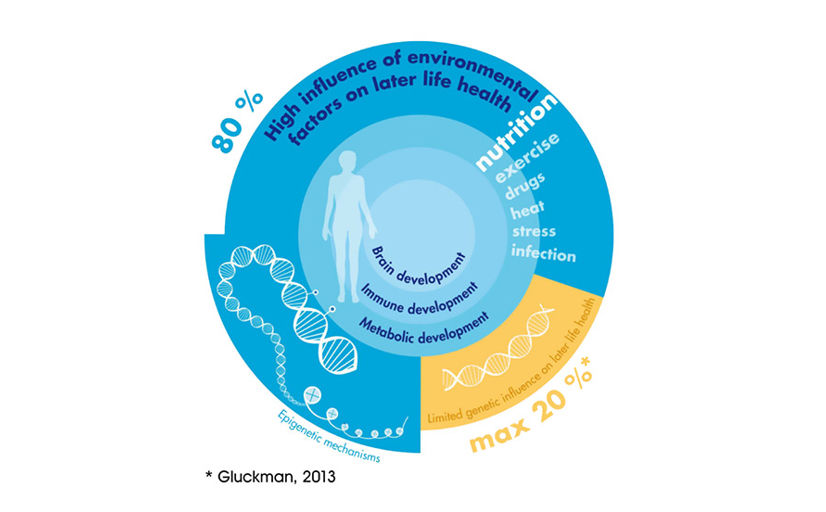The period of time from a child’s conception up until their second birthday, is characterised by rapid growth, development and maturation of organs and systems1. It is a unique period in life during which epigenetic programming takes place2 and variation in the quality or quantity of nutrients consumed by mothers during pregnancy, or infants in early life, can exert permanent and powerful effects upon developing tissues. These ‘programming’ effects are now a well-recognised risk factor for non-communicable diseases of adulthood, including obesity, type 2 diabetes, hypertension, stroke and coronary heart disease1.
The association between early life health parameters & risk of adult disease was first described in the late 80s
In the late 1980s, Barker & Osmond first described the developmental origins of health and disease through ecological studies that showed correlations between place of birth and the risk of death fromcoronary heart disease and between the risk of death ininfancy and coronary heart disease mortality3-5. Following this, retrospective cohort studies, that used health records from a population of 16,000 men and women born in Hertfordshire in the UK between 1911 and 1930, found that lower birthweight was associated with increased coronary mortality6. Further studies that followed up the men aged 64–75 years in this same Hertfordshire cohort showed an inverse association between weight at birth and blood pressure7, type-2 diabetes8 and the insulin resistance syndrome9. In the US, data on birthweight from 70,297 women showed that among full-term singletons, and after adjustment for adult body mass index, the risks of coronary heart disease and stroke were associated with weight at birth. A lower weight at birth was also associated with higher blood pressure in adulthood10. These initial studies into the associations between early life health parameters and adulthood disease were only the start of what continues to be a fascinating area of research.

Early Life Nutritional Exposures Affect Long-Term Physical & Cognitive Health
It is now well accepted that numerous early life exposures can impact long-term health, however early life nutritional exposures are particularly significant and the most well-researched. By providing good nutrition during pregnancy, infancy, and toddlerhood, parents/guardians can make a significant difference to a child’s future eating habits as well as their long-term physical & mental health. The impact of early life nutrition can be summarized below under the headings, ‘Behavioural’ and ‘Physiological’.
Behavioural
- Influences feeding habits11
- Impacts on taste preference12,13
- Affects food texture preferences14,15
Physiological
- Metabolic – processes may be set during early life, determining how the body learns to break down, absorb and use nutrients for lifelong growth and development16.
- Immune – immune system development may be influenced, affecting the future risk of asthma and allergic diseases17.
- Cognitive – brain development may be influenced, with potentially long-term effects on cognitive function and behaviour18.
References
- Langley-Evans SC. Nutrition in early life and the programming of adult disease: a review. J Hum Nutr Diet. 2015 28(1):1-14.
- Linnér A, Almgren M. Epigenetic programming—The important first 1000 days. Acta Paediatrica. 2020;109:443–452.
- Barker, D.J. & Osmond, C. (1987) Death rates from stroke in England and Wales predicted from past maternal mortality.BMJ. 295,83–86.
- Barker D, Osmond C. Infant mortality, childhood nutrition and ischemic heart disease in England and Wales. Lancet. 1986;40:37-44
- Osmond, C., Barker, D.J. & Slattery, J.M. (1990) Risk of deathfrom cardiovascular disease and chronic bronchitisdetermined by place of birth in England and Wales.J. Epidemiol. Community Health 44, 139–141.
- Barker, D.J., Osmond, C., Golding, J., Kuh, D. &Wadsworth,M.E. (1989) Growth in utero, blood pressure in childhood and adult life, and mortality from cardiovascular disease.BMJ. 298, 564–567.
- Barker, D.J.P., Bull, A.R., Osmond, C. & Simmonds, S.J.(1990) Fetal and placental size and risk of hypertension in adult life. BMJ. 301, 259–262.
- Hales, C.N., Barker, D.J.P., Clark, P.M.S., Cox, L.J., Fall, C.,Osmond, C. & Winter, P.D. (1991) Fetal and infant growthand impaired glucose tolerance at age 64. BMJ. 303,1019–1022
- Barker, D.J., Hales, C.N., Fall, C.H., Osmond, C., Phipps, K. &Clark, P.M. (1993) Type 2 (non-insulin-dependent) diabetes mellitus, hypertension and hyperlipidaemia (syndrome X):relation to reduced fetal growth. Diabetologia 36,62–67
- Curhan, G.C., Chertow, G.M., Willett, W.C., Spiegelman, D.,Colditz, G.A., Manson, J.E., Speizer, F.E. &Stampfer, M.J.(1996) Birth weight and adult hypertension and obesity inwomen. Circulation 94, 1310–1315
- Scaglioni et al. Determinants of children’s eating behavior. Am J Clin 2011;94(6):2006s-2011s
- Mennella et al. Prenatal and Postnatal Flavor Learning by Human Infants. Pediatrics 2001;107:e88
- Sullivan SA and Birch LL. Infant dietary experience and acceptance of solid foods. Pediatrics 1994;93(2):271-7
- Lundy B et al. Food texture preferences in infants versus toddlers. Early Child Dev Care 1998;146:69-85
- Northstone K et al. The effect of age of introduction to lumpy solids on foods eaten and reported feeding difficulties at 6 and 15 months. J Hum Nutr. Diet 2001;14:43-54
- Lillycrop KA. Effect of maternal diet on the epigenome: implications for human metabolic disease. Proc Nutr Soc 2011;70(1):64-72.
- Martin R et al. Early life: gut microbiota and immune development in infancy. Benef Microbes 2010;1(4):367-82.
- Schlotz W and Phillips DI. Fetal origins of mental health: evidence and mechanisms. Brain BehavImmun 2009;23(7):905-16.
You may also be interested in
Nutricia offers access to a wide range of support services and resources including:
- • Our free Sampling Service to order product samples and have them sent to your patients' homes.
- • A range of CPD accredited e-learning programmes.
- • Order free paper copies of our support tools for yourself or to use with your patients.
- • Sign up to receiving marketing communications and be the first to know about our free educational events & webinars, the latest scientific research and product updates.
Help us provide information most relevant to you
Please ensure your role and areas of interest are up to date.

